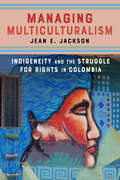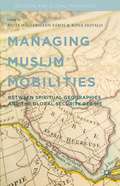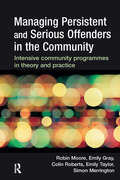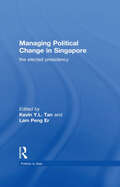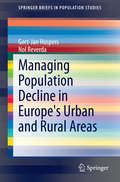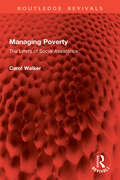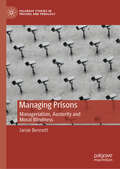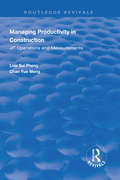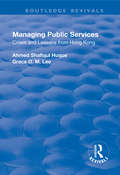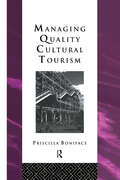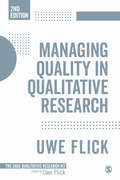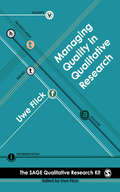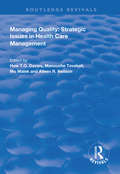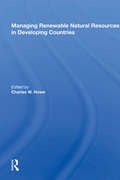- Table View
- List View
Managing Multiculturalism: Indigeneity and the Struggle for Rights in Colombia
by Jean E. JacksonIndigenous people in Colombia constitute a mere three percent of the national population. Colombian indigenous communities' success in gaining collective control of almost thirty percent of the national territory is nothing short of extraordinary. In Managing Multiculturalism, Jean E. Jackson examines the evolution of the Colombian indigenous movement over the course of her forty-plus years of research and fieldwork, offering unusually developed and nuanced insight into how indigenous communities and activists changed over time, as well as how she the ethnographer and scholar evolved in turn. The story of how indigenous organizing began, found its voice, established alliances, and won battles against the government and the Catholic Church has important implications for the indigenous cause internationally and for understanding all manner of rights organizing. Integrating case studies with commentaries on the movement's development, Jackson explores the politicization and deployment of multiculturalism, indigenous identity, and neoliberalism, as well as changing conceptions of cultural value and authenticity—including issues such as patrimony, heritage, and ethnic tourism. Both ethnography and recent history of the Latin American indigenous movement, this works traces the ideas motivating indigenous movements in regional and global relief, and with unprecedented breadth and depth.
Managing Muslim Mobilities
by Anita H. Fábos Riina IsotaloFábos and Isotalo address the issue of forced migration and mobility in the Muslim world. Their work explores the tensions between Muslim religious conceptions of space and place and new policies of 'migration management' and secure borders.
Managing Natural and Cultural Heritage for a Durable Tourism
by Anna Trono Valentina Castronuovo Petros KosmasThis contributed volume offers a wealth of cases that explore the factors and conditions required for heritage tourism to be economically and socially beneficial to local communities without impairing the natural environment, cultural heritage preservation, or sustainability for future generations. The studies presented here comprise an examination of measures which have been and can be implemented to ensure sustainable use of natural and cultural systems, leading to a new concept of tourism that incorporates science and community practices together to create a favorable environment where tourists and locals can experience meaningful interactions and experiences. The book focuses on the role of stakeholders in the development of a new policy regarding the sustainable management of cultural tourism and the possibility of their involvement in the processes governing policy-making. Emphasis is placed on the role and commitment of local and international authorities, including UNESCO, in preserving the world's endangered cultural and natural heritage, as well as the responsibilities of Member States and public and private actors with respect to future conservation challenges.
Managing Online Reputation: How to Protect Your Company on Social Media (Palgrave Pocket Consultants)
by Charlie PownallManaging Online Reputation is a comprehensive look at online reputation management. Drawing on recent examples of organizations managing their online reputations effectively and ineffectively, it provides a practical and visual tool-kit of processes and techniques to help limit and respond effectively to negative situations on social media.
Managing Overflow in Affluent Societies (Routledge Advances in Sociology)
by Orvar Löfgren Barbara Czarniawska“It is simply too much” is a common complaint of the modern age. This book looks at how people and institutions deal with overflow - of information, consumption or choices. The essays explore the ways in which notions of overflow – framed in terms of excess and abundance or their implicit opposites, scarcity and dearth – crop up in a number of contexts such as sociological and economic theory, management consulting, consumer studies, and the politics of everyday life. Chapters range from studies of overload at home, at work or in the world of cyber information; strategies of coping with overflow in institutions such as news agencies; and historical comparisons. When, where, how and for whom is overflow a problem or a blessing?
Managing Persistent and Serious Offenders in the Community
by Robin Moore Emily Gray Emily Taylor Colin Roberts Simon MerringtonOver the last few years intensive community programmes for both young and adult offenders have become established in the UK as an important new component of penal policy ? the ISSP (Intensive Supervision and Surveillance Programme) for persistent and serious young offenders, and the ICCP (Intensive Control and Change Programme) for adult offenders. Expectations of these programmes have been high, but the evidence relating to their effectiveness is mixed, and a number of critical concerns have emerged. This book seeks to address these issues, providing a timely review of the current literature, and presents findings of a recent national evaluation of ISSP. Emerging lessons for future penal policy are presented, and set within a wider theoretical context. The book concludes by stressing the need for greater realism and further evidential support if such programmes are to gain long-term credibility, and also to consider the appropriateness of differing forms of targeting as well as the emphasis placed on the various methods of surveillance.
Managing Policy and Reform in an Era of American Police Conflict: Who Will Guard the Guardians? (Innovations in Policing)
by Jack St. HilaireThe Greek philosopher, Socrates, posed a guardian model that would protect his Athenian world, the custodes (watchmen), yet mused who would guard them but themselves. In The Republic, Plato spoke favorably about the guardians of the republic; they should be trusted to behave and perform their duties appropriately without oversight. Half a millennium later, the Roman satirist, Juvenal, proposed that men who feared their wives’ infidelity could neither trust them nor the guardians who guarded them. Similarly, James Madison opposed oppression through blind trust and, thus, conceptualized Madisonian Democracy. Quis custodiet ipsos custodies? Who will guard the guardians? In an era of conflict with America’s police and the communities they serve, today’s publicly expressed attitudes toward law enforcement often reflect Socrates’ dilemma and the concerns of Juvenal more than that of Plato’s tributes. Contemporary debates concerning the increase in violent crime and the need for fundamental changes to American policing reached a new intensity and stalemate with the death of George Floyd in Minneapolis in May 2020. Police officers shot and killed 999 people in 2019 and 1021 people in 2020 in the United States. 2020 was also one of the deadliest years for law enforcement, with 264 officers killed, the highest since 1974. In the first six months of 2021, 523 civilians were shot and killed by officers. Numerous active and former police officers face criminal charges for the January 6 United States Capitol Attack in Washington, DC, in 2021. Many current and former employees of the U.S. Border Patrol were discovered to be members of a Facebook group that posted racist and anti-immigration content. Sixty current members were found to have committed misconduct by posting “explicit and violent messages” mocking migrants and threatening lawmakers on the site. Communities are now hiring civilians to high positions in the police department’s command staff, justifying the need to improve deteriorating community relations. For the first time in its 27 years of measuring confidence in the police in the United States, Gallup found that most American adults do not trust law enforcement. This book investigates and exposes the complex challenges facing law enforcement leaders and government officials with police reform, policies and standards, police accreditation, and police legitimacy in the eyes of the community. Through informative and educational discussions with law enforcement leaders from various agencies, professional police organizations, and academic researchers, the book qualitatively evaluates individual autonomy, organizational culture, and political environments, which influence strategic decisions made on policy and reform efforts by law enforcement officials in the United States within the milieu of national police accreditation.
Managing Political Change in Singapore: The Elected Presidency (Politics in Asia)
by Lam Peng Er Kevin TanThe Singapore parliament's creation of an elected presidency in 1991 was the biggest constitutional and political change in Singapore's modern era. This multi-disciplinary study gathers papers from leading scholars in law, history, political science and economics to examine how political change is managed in Singapore. It is an authoritative addition to debates surrounding the management of political change in developing countries more generally.
Managing Political Change: Social Scientists And The Third World
by Irene L. GendzierFor nearly three decades, policymakers and students have been concerned with Third World societies in transition. Conventional interpretations of political change, formalized in studies of political development, have dominated approaches to analyzing such changes. Yet, argues the author, these interpretations have been justly criticized as bankrupt and irrelevant to Third World realities. Why are they reproduced? How can one explain the belief that these approaches remain viable? These are some of the questions addressed in this wideranging review of the literature of political development and the paradigms that have guided analysis of political change over the past thirty years. Examining how political development theories are rooted in U.S. foreign policy, domestic political trends, and changes in postwar political science, Dr. Gendzier grounds the traditional approach to political development in recent history and politics. Her analysis raises questions about how development doctrine is related to foreign policy, as well as noting development theory's debt to cold war ideology and revisionist theories of liberal democracy. Dr. Gendzier's interpretation sheds light on the reasons for the current theoretical bias that favors approaching politics in terms of psychology and culture—an approach that, she states, has had devastating effects on our understanding of politics.
Managing Politics and Islam in Indonesia
by Donald J. PorterFirst published in 2004. Routledge is an imprint of Taylor & Francis, an informa company.
Managing Politics and Islam in Indonesia
by Donald PorterThis book examines the politics of Islam and the state in Indonesia over recent decades, during which time there has been a notable resurgence of Islamic political movements. It argues that after a period in the late 1980s and 1990s, when the state worked to bring religious authority and institutions within state-prescribed limits in order to support the official state ideology and political stability, there was a change whereby Suharto incorporated Muslim interests within the political system. One unintended consequence of this was to raise Muslims' political expectations and to mobilise Muslim political interests in the context of broadening 'pro-democracy' opposition which contributed to the downfall of Suharto's regime. Based on extensive original research, including interviews with participants, the book charts the shifts in relations between Islam and the Indonesian state over time, assessing the impact on other groups, and on the cohesion of Indonesia overall.
Managing Population Decline in Europe's Urban and Rural Areas
by Gert-Jan Hospers Nol ReverdaThis book explores the challenges population decline presents for Europe's urban and rural areas. It features recent demographic data and trends not only for Europe as a whole, but also for selected countries, and compares growth and shrinkage from a historical as well as a theoretical perspective. In addition, the book critically reviews relevant notions from geography, sociology, and public administration. It also identifies good practices across Europe. Throughout, theories are complemented with concrete examples and proposals are made on how to tackle demographic shrinkage in European cities and villages, from attempts to attract new residents to the countryside to innovative ways to guarantee public services. In the end, the authors conclude that solving the challenges caused by population decline require novel ways of thinking and provide answers to such future-oriented questions as: how to ensure the quality of life in an environment that is inhabited by fewer and older people, what investments are needed, and which actors should be involved. Managing Population Decline in Europe's Urban and Rural Areas offers detailed coverage of an underestimated and complex governance issue that asks for solutions in which citizens have to play an important role. It concludes that shrinkage requires a rethink of the specific tasks and roles of government and presents a way forward based on initiatives currently underway throughout Europe. The book will be a valuable resource for population policy makers as well as students and researchers interested in human geography, urban planning, rural development, European studies, public administration, and other social sciences.
Managing Poverty: The Limits of Social Assistance (Routledge Revivals)
by Carol WalkerSince the Second World War, the means test has played a role of growing importance in British social security provision. Beveridge’s vision of a society protected by a national system of social insurance has never been realized and, instead, social assistance, designed as a residual and diminishing means of support, has gradually been expanded to make up for the inadequacies of a national insurance system which was at first neglected and then attacked by governments. This important shift in the founding principles of the British income maintenance programme occurred without any public or parliamentary debate and without public acknowledgement by government that it was happening. As a result, British social assistance provision has continually been stretched beyond reasonable limits.First published in 1993, Managing Poverty examines the reasons for the growing importance of social assistance in British social security policy, traces the many changes introduced by successive governments, and explores in detail why both Conservative and Labour governments have been unsuccessful in finding permanent solutions to the recurrent problems that have emerged. Most of the previous literature on this subject has concentrated on the policy-making process, but Carol Walker looks at the efficacy of these policies from the point of view of the service users, the claimants. She uses empirical evidence on the experiences and views of claimants to evaluate benefit provision.This book will be an invaluable text to all undergraduates and postgraduates in the social sciences, particularly social policy, and to all welfare professionals.
Managing Prisons: Managerialism, Austerity and Moral Blindness (Palgrave Studies in Prisons and Penology)
by Jamie BennettThis book critiques the practices of managerialism and their effects on those who live and work in prisons. It draws upon ethnographic research conducted in English prisons over a 15 year period, written by a former prison governor. Since the last years of the 20th century, public services in England have increasingly adopted managerial approaches with an architecture of target setting, surveillance and assertive line management. The book examines how this system was created and then evolved during the period of austerity after 2010 and was disrupted during the coronavirus pandemic of 2020-22. It proposes an alternative approach, re-energising the agency of prison managers, reinvigorating a more localised approach, and developing measures that address the lived experience of people in prison. This book will be of particular relevance to prison managers and policy makers, researchers interested in criminology, the sociology of prisons, and the sociology of work, as well as to post-graduate students exploring prison work.
Managing Productivity in Construction: JIT Operations and Measurements (Routledge Revivals)
by Low Sui Pheng Chan Yue MengFirst published in 1997, this volume joined the debate assessing the potential of the Just-In-Time management philosophy from the manufacturing industry for Singapore’s construction industry by examining the "off-site" prefabrication of precast concrete components in Singapore, in comparison with traditional management systems. In the wake of the 1991 Strategic Economic Plan of Singapore, which forecasted alarmingly low productivity in the local construction sector, the authors noted that construction in Japan was 35% more productive, whilst Finland was 75% better. Highlighting immense potential for the JIT approach, they explore the JIT philosophy, traditional systems, construction wastes and comparisons between construction and manufacturing.
Managing Projects in Developing Countries
by John W. Cusworth T. R. FranksCovers the concepts, systems and skills of project management, identifying the three major elements of organisations: implementation, planning and procurement.
Managing Projects in Health and Social Care
by Vivien MartinManaging Projects in Health and Social Care is designed for anyone who is asked to manage a public services project but who lacks the experience or training to feel confident in this role. The book shows how to use project management techniques to ensure that your project will be successful. The key dimensions discussed are: * budget* time* feasibility* planning / scheduling* implementation* evaluation.The book includes many examples to show how people have used the techniques described in health and care settings. There are clear explanations of how and when to use each technique and consideration of the differences between large and complex projects and smaller, less complicated ones. It is a valuable resource for anyone who wants to be sure that their project will make a useful contribution to improvement of health and care services.
Managing Public Services: Crises and Lessons from Hong Kong (Routledge Revivals)
by Ahmed Shafiqul Huque Grace O.M. LeeThis title was first published in 2000: The management of public services is becoming an increasingly difficult task. Demands are increasing while funds appear to be decreasing, but quality of service must remain high. New services are required, demands have to be faced, activities don't always go according to plan and problems emerge in unexpected places and at unusual times; and public managers are expected to deal with these deviations from their regular work patterns. While some activities are concrete in nature and can be seen, such as medical care and education, others are obscured from public view. With governments emphasizing areas that produce visible and quantifiable results, they often neglect the intangible services that must also be provided to the public. Poor performance in these areas can contribute to major crisi in public organizations. This volume examines four case studies in the context of the changing political and social environment of the new Hong Kong Special Administrative Region of the People's Republic of China. The use of these cases from the public sector in Hong Kong will hopefully help readers to understand the difficulties faced by modern governments in providing basic services to the public.
Managing Quality Cultural Tourism (Heritage: Care-Preservation-Management)
by Priscilla BonifaceManaging Quality Cultural Tourism is an authoritative look at how to manage cultural tourist sites to best meet the needs of the visitors, the presenters and the site itself. As cultural tourism increases the management of heritage sites becomes more complex. Priscilla Boniface addresses these crucial management issues using a marketing approach to identify the needs of all concerned. This volume is specifically aimed at professionals and students of leisure, tourism and heritage management. It provides an invaluable background to cultural tourism and then focuses on some important issues involved with managing a heritage site - education, entertainment and preservation - and considers appropriate ways of dealing with the needs of the tourist, the presenters and the cultural site. Managing Quality Cultural Tourism suggests a way forward for cultural tourism. It is an indispensable tool for all involved in tourism and heritage industries.
Managing Quality Cultural Tourism (Heritage: Care-Preservation-Management)
by Priscilla BonifaceManaging Quality Cultural Tourism is an authoritative look at how to manage cultural tourist sites to best meet the needs of the visitors, the presenters and the site itself. As cultural tourism increases the management of heritage sites becomes more complex. Priscilla Boniface addresses these crucial management issues using a marketing approach to identify the needs of all concerned.This volume is specifically aimed at professionals and students of leisure, tourism and heritage management. It provides an invaluable background to cultural tourism and then focuses on some important issues involved with managing a heritage site - education, entertainment and preservation - and considers appropriate ways of dealing with the needs of the tourist, the presenters and the cultural site.Managing Quality Cultural Tourism suggests a way forward for cultural tourism. It is an indispensable tool for all involved in tourism and heritage industries.
Managing Quality in Qualitative Research (Qualitative Research Kit #10)
by Dr Uwe FlickQuality underpins the success (or failure) of any piece of qualitative research. In this book, Uwe Flick takes you through the steps in method and design to ensure quality and reliability throughout the entire research process. Showing hands-on what it means to 'manage' quality, this book puts the spotlight on practical questions and steps researchers can use to continually interrogate, improve and demonstrate quality in your research.
Managing Quality in Qualitative Research (Qualitative Research Kit #10)
by Uwe FlickQuality underpins the success (or failure) of any piece of qualitative research. In this book, Uwe Flick takes you through the steps in method and design to ensure quality and reliability throughout the entire research process. Showing hands-on what it means to ′manage′ quality, this book puts the spotlight on practical questions and steps researchers can use to continually interrogate, improve and demonstrate quality in your research.
Managing Quality in Qualitative Research (Qualitative Research Kit)
by Dr Uwe Flick'Flick's argumentation in this book is convincing. It provides a good overview of the problems of quality assessment in qualitative research and makes constructive suggestions about how to deal with them' - Thomas S. Eberle, University of St Gallen, Switzerland. The issue of quality in qualitative research is one that is often neglected. In Managing Quality in Qualitative Research attention is given to the fundamental question of how to define and assess the quality of research. Uwe Flick examines how to distinguish good research from bad research when it comes to teaching, planning, evaluating and publishing qualitative research.
Managing Quality: Strategic Issues in Health Care Management (Routledge Revivals)
by Mo Malek Manouche Tavakoli Huw T.O. Davies Aileen R. NeilsonFirst published in 1999, this eclectic collection of papers examines quality management in health care from a variety of standpoints. Managers, health care professionals and patients all have valid – but often differing – perspectives on the nature of quality, its creation and maintenance. This book explores these perspectives, beginning by asking such fundamental questions as ‘Is health care a business?’, ‘How should health services be designed?’ and ‘What is quality of care?’. Subsequent chapters then address the practicalities of measuring and improving health care quality. The chequered history of clinical audit is exposed in the UK (essentially the Plan-Do-Check-Act cycle familiar to quality improvement specialists), and lessons are drawn for managerial action needed to increase the impact of such activities. These lessons have wider relevance to all involved in promoting the principles of continuous quality improvement (CQI). In addition, exploration of the growing role of performance indicators raises important issues about their meaningfulness and instrumentality in effecting real change. Improving clinical quality is now at the top of the agenda for many health systems. This book reviews the challenges faced and the tools available to meet them. It should prove valuable to a wide range of health care stakeholders interested in broadening their understanding of this rapidly developing field.
Managing Renewable Natural Resources In Developing Countries
by Charles W. HoweMuch of the improvement in material living standards in the Third World is attributable to the exploitation of nonrenewable resources such as fossil fuels and metallic ores, and to the exploitation of renewable resource systems at rates that cannot be sustained. This state of affairs presents a serious problem for the future; just as may be the case for the developed regions, a long-term perspective shows clearly that Third World countries must return to a greater dependence on renewable resources while also avoiding irreversible degradation of renewable systems and learning to manage these systems more productively. The authors of this book examine major issues in the four main renewable resource sectors—fisheries, forestry, agriculture, and water—with emphasis on the problems and benefits attendant to various use patterns and management practices.
